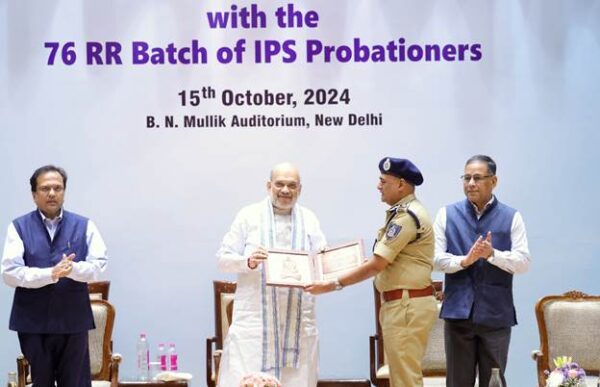Shaping Future Policing: Amit Shah’s Vision for a Secure India

Union Home Minister and Minister of Cooperation Amit Shah interacted with the 2023 batch of Indian Police Service (IPS) probationers in New Delhi, outlining Prime Minister Narendra Modi’s vision for a terror-free and drug-free India by 2047. This ambitious goal prioritizes internal security, human rights, and citizen protection.
Amit Shah shared valuable insights with probationers, emphasizing the importance of continuous improvement and the significance of every task, no matter how small. He encouraged them to adopt a mindset where they strive for excellence in all aspects of their work, as this will help them avoid many disappointments in life.

Shah noted that for any police officer posted as SP in their youth, the greatest achievement will be earning the enduring respect and admiration of the people in their district for their good work. This legacy is a testament to the positive difference they’ve made in the community.
The Union Home Minister stressed the need for young officers to take a robust approach in eliminating anti-national activities, prioritizing national security. He reminded them that their primary responsibility is to ensure the nation’s security and they must remain vigilant and focused on this goal.
Shah emphasized the significance of the current batch of IPS officers, stating that they will shoulder greater responsibilities than their predecessors. He urged them to contemplate their role in shaping the future of policing in India.
India’s borders are now secure, with no one daring to insult the country’s borders or army, thanks to enhanced security measures. Indian agencies have established dominance in previously volatile regions, including Jammu & Kashmir, the North East, and Left Wing Extremism-affected areas, reducing violence by 70%.
Shah attributed this success to the government’s efforts and noted that the culture of democratic change has minimized large-scale protests. He emphasized that protecting citizens’ rights and safety is paramount, particularly for vulnerable populations such as the poor, children, and women.
The Union Home Minister highlighted significant advancements made through the Crime and Criminal Tracking Network & Systems (CCTNS), with 99% of police stations now online. Recent laws prioritize timely justice, increased evidence for conviction, and maximum technology utilization.
Shah emphasized that the three new laws secure citizens’ rights by mandating online declaration of individuals in police custody, filing chargesheets within 90 days, and videography of search and seizure operations. The National Automated Fingerprint Identification System (NAFIS) and National Crime Record Bureau (NCRB) manage critical data.
Leveraging technology, the Home Ministry is developing software using artificial intelligence to simplify analysis. A national-level data bank has been created to aid investigation.
Shah stressed that national security encompasses not only border security but also the protection of citizens’ rights and lives. The Constitution guarantees equal rights to all citizens, regardless of social status, and police officers have a critical role in upholding these rights.







